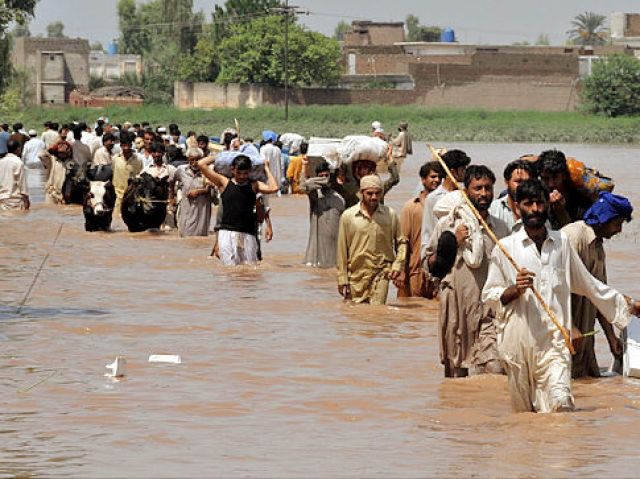
The following statement was released on August 20 by the Labour Party Pakistan (Karachi) and Pakistan’s National Trade Union Federation. See Laborpakistan.org for more information.
The recent floods represent the worst disaster in Pakistan’s history. The country has been devastated from the northern areas to its southern tip.
The state, stripped of its capacity to meet people’s needs by neoliberalism and militarism alike, has been found wanting — both in its longstanding failure to maintain existing infrastructure, and in its response to the calamity.
The grassroots relief efforts that have emerged across the country are heartening, but a crisis of this magnitude can only be handled by an institution with the resources and reach of the federal government.
As in all disasters, the assistance of the military will be necessary — but this must be subject to civilian oversight and not exploited to glorify the army at the expense of the government.
The military’s relative strength is a direct legacy of pro-army federal budgets, and we remember too well the failures of the Musharraf government in 2005 [after an earthquake].
Reconstruction costs have been provisionally estimated at US$15 billion — a mammoth 46% of the total federal budget for the next fiscal year. It is critical, therefore, that the political and structural roots of the crisis be urgently addressed.
As of July, Pakistan’s total external debt stood at $54.5 billion. A great majority of the debt is owed to multilateral institutions, the Paris Club donors and the International Monetary Fund (IMF). All of the debt could be written off if the political will were found.
Servicing the public and publicly guaranteed portion of the external debt in the 2010 financial year amounted to roughly $3.4 billion — an amount seven times larger than the United Nation’s initial aid target of $450 million.
The Pakistan state should not be sending this kind of revenue overseas while people die of hunger and disease at home.
The budget must be revisited, with the intention of cutting all excess expenditure and redirecting money toward relief and rehabilitation. Current discussion about revising the budget calls for cuts to development spending, when it is the military budget that must be targeted.
The 442.2 billion rupees allocated to defence in the current federal budget is up 13% from the 2010 financial year.
International governments must radically increase assistance to Pakistan. The amount thus far collected is miniscule relative to what the moment demands.
The assistance offered by the Asian Development Bank and the World Bank are loans, and will have to be repaid — a fate that Pakistan’s poor are unlikely to be able to afford at any stage in the immediate future. Assistance to the Pakistan government must be made as grants.
We further call on the international community — specifically the anti-war movement — to redouble its efforts to expose and redirect the enormous resources wasted on the criminal wars in Iraq and Afghanistan-Pakistan.
The US spends about $12.2 billion on the occupations of Iraq and Afghanistan every month. The cost of the Afghan surge alone was $33 billion — roughly 220 times greater than the amount the US has pledged for flood relief in Pakistan.
Evidence is also emerging that links these floods to rising atmospheric temperatures, and thus to climate change. Three-quarters of all carbon emissions have been produced by only 20% of the world’s population, and it is the poor in the developing world who are bearing the brunt of the resulting environmental degradation.
The rich countries ought to offer urgent reparations to Pakistan as compensation for suffering the costs of others’ industrialisation.
Finally, after the corruption that marked earthquake relief efforts, we recognise the importance of the aid being distributed in a transparent and democratic manner.
We support the creation of a separate national commission to oversee reconstruction spending, provided it fulfils its mandate and is made entirely open to public scrutiny. All relevant authorities should further be brought under civilian control.
Recognising all this, we call urgently for action based around the following demands:
• Cancel the debt;
• Cut defence expenditure;
• International assistance in grants, not loans;
• Redirect US military spending;
• Reparations for climate change; and
• Democratic and transparent reconstruction.
Only the pressure of a popular movement can force the hand of the government and international community.